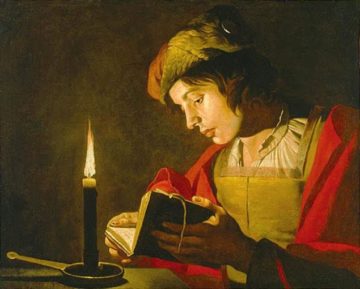by Chris Horner

What should we look for in literature? And in the arts and humanities in general? It’s a large question with many answers, some better than others: entertainment, edification, elevation – and much more. A more limited question might be: what is the point of studying it?
Let’s stick with literature as our example.Think of all the students studying the novel, poetry, drama, essays and more. A multitude of students, teaching staff, departments and institutions. And an awful lot of money, much of it in the form of debt. Assuming that at least some of those who enrol and don’t go on to an academic career will want to go and read, see and listen to the things they wrote essays about in school and college, what is is it supposed to mean for them? I got to thinking about that after being present at a conversation about an author (DH Lawrence) between an academic and a reader who had obtained a degree in English and American literature over forty years ago. It went something like this:
Graduate: DH Lawrence is a very interesting writer.
Academic: I agree.
Graduate: The value of Lawrence is both in what he wants to say about life, and the way in which he says it – the art of the The Rainbow, Women in Love, the poetry – Lawrence has an urgent message for us about one’s life and how it might be more richly lived. How do your students respond to it?
Academic: Well, that’s not really what we are interested in at [well known UK university].
Reader: How can it not be?
Academic: We don’t approach any text with that kind of thing in mind. What we study and teach is the social and historical context in which it was produced, the the social background to the text’s production, the forces that shape and mark it: political, economic, questions of gender etc are all important aspects: the discursive and ideological forces that shaped it and made it part, or not part, of the canon.
Reader: But isn’t that missing the point of what DHL has to say? I think he has something to say to me. Of course he is open to criticism – but that’s what the study of literature is about, isn’t it? The questions of value that are raised in our reading of great literature?
Academic: it’s naive to just pick up a text and think of it as speaking to you in an unmediated way, just like that.
The conversation went on, but didn’t really get much further than the positions I’ve very roughly outlined above. The subject was literature but it could surely have been about all sorts of cultural production – the visual arts, for instance.

The conversation itself left me wondering at how so large a gap could have opened up between the one time literature student and the academic. How did their view of what it means to pay attention to literature drift so far apart? My first instinct was to sympathise with the Reader: isn’t literature partly about the question of how we live our lives, how to experience it? The imaginative work of the artist, her handling of formal qualities as as much as what a text might seem to ‘say’ is surely something to do with the enrichment of life. That is why we study sonnets rather than till receipts.
But her interlocutor had a point too. Art isn’t created isolated from history and culture: to fail to grasp this is to miss something important about cultural production itself – the political charge that it carries, the ways in which assumptions about gender, class and race are inscribed in it. And the text, whatever the genre, is never an unmediated communication from Genius to Reader.
I was reminded of this question when I came, very belatedly, to the reviews of a book that has caused something of a stir in the smallish ponds of leftish academe: Literary Criticism: A Concise Political History by Joseph North [1]. It is certainly an interesting book, more interesting perhaps than its title might lead one to think. The publisher describes the aims of the book on the inside of the dust jacket:
People in today’s literature departments often assume that their work is politically progressive, especially when compared with the work of early- and mid-twentieth-century critics. North’s view is less cheering. For when understood in relation to the longer arc of the discipline, the current historicist and contextualist mode in literary studies represents a step to the Right. Since the global turn to neoliberalism in the late 1970s, all the major movements within literary studies have been diagnostic rather than interventionist in character: scholars have developed sophisticated techniques for analysing culture, but they have retreated from systematic attempts to transform it. In this respect, the political potential of current literary scholarship compares poorly with that of earlier critical modes, which, for all their faults, at least had a programmatic commitment to cultural change.
Yet neoliberalism is now in crisis—a crisis that presents opportunities as well as dangers. North argues that the creation of a genuinely interventionist criticism is one of the central tasks facing those on the Left of the discipline today.
 North is clearly unhappy with a ‘historicist and contextualist’ approach that, while it might have Women in Love on the reading list, might as well be studying any potboiler from the1900s. Not many young students get so interested in reading that they want to study it at university just because of the historical and contextual issues that literature raises. Yet they should get to know what those are. So how can we go forward from here? Surely not by trying to return to the critical methods of the 1950s and before; and surely not by telling the idealistic young student that they are somehow gauche for looking for literature as a way to, as North puts it, to ‘cultivate deeper modes of life’.
North is clearly unhappy with a ‘historicist and contextualist’ approach that, while it might have Women in Love on the reading list, might as well be studying any potboiler from the1900s. Not many young students get so interested in reading that they want to study it at university just because of the historical and contextual issues that literature raises. Yet they should get to know what those are. So how can we go forward from here? Surely not by trying to return to the critical methods of the 1950s and before; and surely not by telling the idealistic young student that they are somehow gauche for looking for literature as a way to, as North puts it, to ‘cultivate deeper modes of life’.
The book generated a lot of interesting discussion in a number places. The New Left Review, in particular has a good deal of stimulating responses, many of them critical of aspects of North’s argument, but all, I think, recognising that he had raised an important topic. I’ll just mention one of the responses, that I think made a very useful suggestion. It was by Benjamin Kunkel:
[North’s] argument requires […] not relief from historicism, as the key to a renewed criticism, but intensification of it. Just as North says, historicist criticism as we have known it fails to speak to readers, in confidential tones, of their own lives and troubles—except not through an excess but an insufficiency of historicism. Such criticism has wrongly tended to grant ‘the personal’ its factitious autonomy from the larger history that unhappy families and individuals embody each in their own way.
A ‘total historicism’ of the kind Kunkel recommends:
….would be to apply Jameson’s slogan ‘Always historicize!’ or Gramsci’s dictum of an ‘absolute historicism’ not only to cultural artifacts and current events but to one’s own person and milieu and circumstances.Reading literary works would then become, among other things, the encounter of one small shard of history (oneself) with another such sliver (the text). It might also allow us to regard both objects with due sympathy and ruthlessness. [2]
Kunkel concludes that, given the plight that arts and humanities departments generally find themselves in, it looks like an approach that might have to happen increasingly outside, rather than within the academy. No bad thing perhaps, that we get outside the walls of such institutions, although I wish nothing but well to those within them who see the importance of this kind of project. Nevertheless it may be that those of us on the outside of such places have a task to do that can’t be left to those who earn their bread by teaching it to students. Literature – and art itself – is too important to leave to the academics.
***
 [1] Literary Criticism: A Concise Political History. Harvard University Press, 2017.
[1] Literary Criticism: A Concise Political History. Harvard University Press, 2017.
[2] Benjamin Kunkel: Critic, Historicize Thyself! New Left Review 136, July/August 2022.
